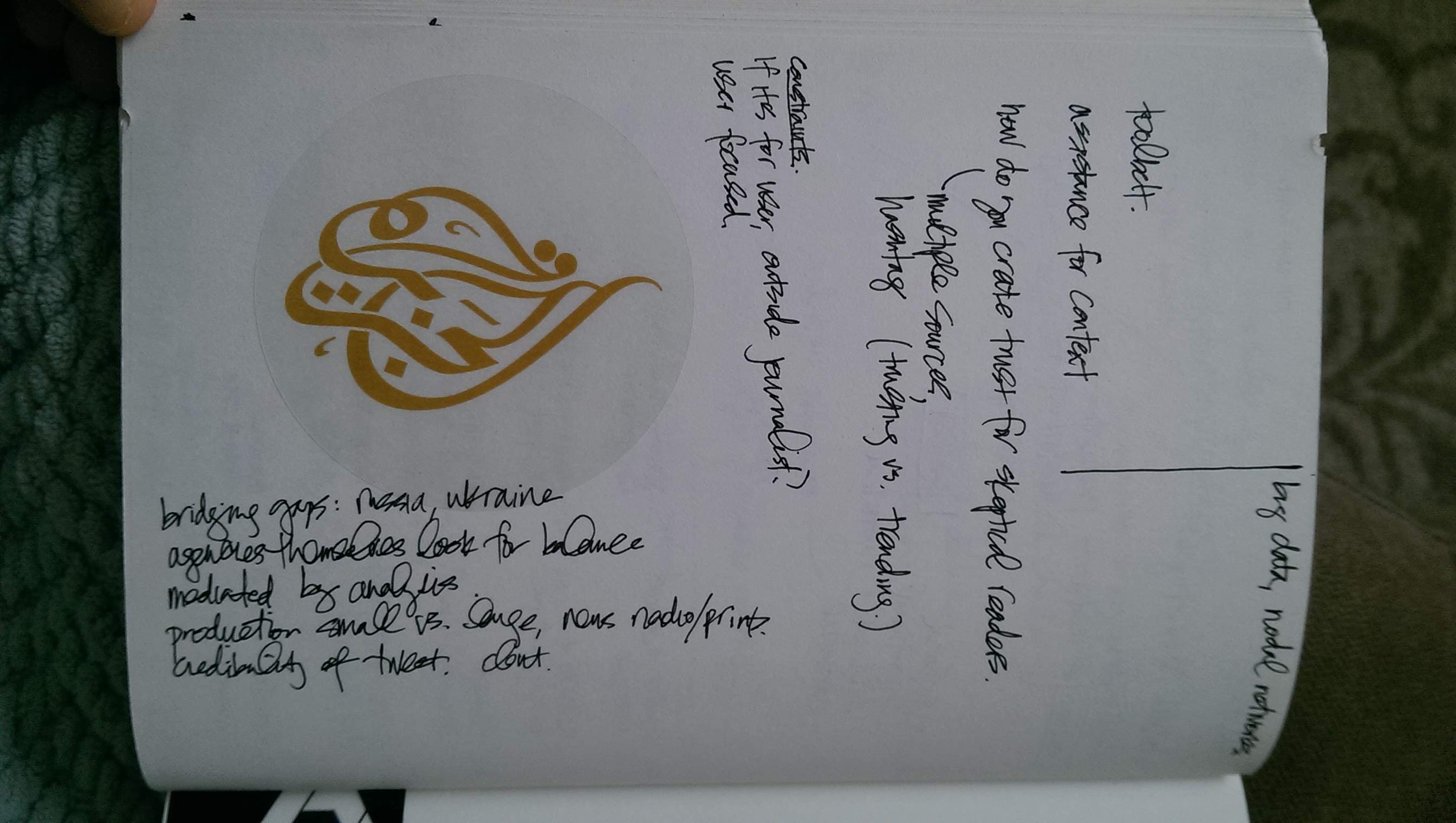Hackathon at Al Jazeera
Al Jazeera invited me to join a hackathon at their headquarters in Doha.
We were addressing the issue of trust in the media. Through a Chrome extension designed for minimal distraction, we provide a news agency with additional transparency using a mixture of public feeds, social networks, open data and scraping techniques. We render a profile of the author, publisher and the article's resonance (retweets) to provide the reader with contextual information on who is writing the article -- and who is consuming it. The tool also can highlight words that might indicate a certain bias or sensationalism.

My notes taken during the Canvas conference.
The tool builds upon a new pervasive skill of readers to quickly gather impressions about a person, place and subject through a quick glance of a profile.
We were the only team that addressed our challenge through the context of social media, and we designed our tool upon a faith in journalistic principles, and upon the reader's own ability to assess trustworthiness. Technology cannot solve the issue of trust, but it can provide a medium to provide critical information for make an individual assessment. Our tool is a frictionless way for both the newspaper and the reader to gather metadata about an article.
We took top prize in the category "Best Embodiment of Values and Ethics".
Who wrote this article?
I begin reading an op-ed piece published by Al-Jazeera. The author is detected by the Chrome extension and its icon indicates a match. In the background we retrieve the Twitter account and recent publication history of the author, and show crowd-sourced data about the publisher.
We see that Greg identifies very strongly with the book that he's written about oil: he references it in his Twitter nick, his Al-Jazeera bio, his twitter Bio, and his profile image. His recent article history shows two articles listed two years apart, both on the topic of oil. The application doesn't tell me what to make of this information, or whether or not I should trust it. It provides a tool to make my own assessment. This might be quite subtle: in this instance, I now recognize Greg as an expert oil, and I'm conscious that there could be a PR element to publishing this op-ed piece. That isn't per se a bad thing, but it's something I'd like to know.
Highlights from other teams
Street Stories provides a panoramic street-view tool to narrate an event through both space and time. Their presentation focused on the events unfolding in Ferguson, something on everyone's mind during the event, and a topic I blogged about before leaving. Their solution paired rich media with a three dimensional view, providing a new context for image and video.
Newsclip.se is an organizational and information sharing platform for journalists conducting research and building institutional memory. The user experience of this tool is shockingly good. A member of their team is also a technical contributors to OneWorld: Heinze Havinga (https://twitter.com/HEINZEHAVINGA) from Enschede, NL. We're proud of you and your team, Heinze!
Lasertag mapped more than 1 million relationships during their sprint to extract archival content from the Al Jazeera API. To demonstrate the concept, they wrote a plugin for Wordpress that listed relevant archival articles that overlapped the current draft of an article based on keywords and prevalence. As one of judges commented after their presentation, the wealth of past content is one of the most underused tools from an institution's toolbox. Lasertag addressed that issue from the production phase of journalism and provided an interface to work alongside a writerly environment.
Canvas is the start of a community
I met journalists, data scientists, media experts, specialists in machine learning, activists, designers, mathematicians, mappers and a wide variety of developers. The gender gap was small compared to most hackathons, with 40% women in attendance, and our group of 87 hackers flew in from 37 different countries. This came from a selection pool of 1,600 applicants.
What impressed me the most about this event -- generously hosted by Al Jazeera and flawlessly executed by Second Muse -- was this commitment to diversity. The content of the ideas were pushed to a higher level because of it, and set the tone and direction of our experiments.
To our hosts, organizers, mentors and to my teammates: a big thank you from Amsterdam!